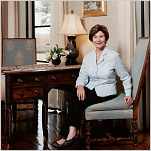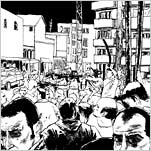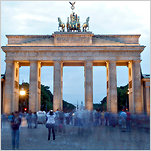LONDON — The banking giant Barclays — like the British government whose bailout money it has spurned — faces a crisis of confidence among investors who are reluctant to take the word of anyone, banker or politician, at face value.
Barclays took steps to address that credibility gap after it announced Monday that it would write down an additional £8 billion ($11 billion) for 2008.
In an open letter from the chief executive, John S. Varley, and the group chairman, Marcus Agius, the bank said that it had no need for new capital, saying that its expected profit from strong performance in investment banking, commercial banking and wealth management should enable it to withstand the pain of the write-downs.
“We confirm in this letter,” the executives wrote, “that we are not seeking subscription for further capital, either from the private sector or the U.K. government.”
Strong words, and they seemed to work: Barclays shares rose 73 percent on Monday.
Yet just as President Ronald Reagan once demanded that the world trust but verify, investors in Barclays — and in British financial assets generally — are requiring an extra level of disclosure as one bailout plan follows another, and the promises of bankers turn out to be short-lived.
The letter from Barclays managers followed one of the more humiliating trading weeks in the bank’s 318-year history.
Fearing that the losses from write-downs were greater than management would acknowledge, and that a government takeover of the bank might now be possible, investors sent Barclays stock plunging last week to a low point of 51.2 pence a share. That brought the bank’s market value below the £5.3 billion pretax profit that Barclays has insisted it will report for 2008.
Analysts have long believed that Barclays, which wrote off £1.6 billion early last year, has been too optimistic in assessing the value of its mortgage-related assets. They say that the bank had £11.5 billion of exposure to distressed commercial real estate and mortgages, more than twice its market capitalization.
Barclays is not alone. The revelation last week that the Royal Bank of Scotland, now 70 percent owned by the government, posted a loss of £28 billion last year — the biggest loss in British corporate history — and continuing uncertainty as to whether HSBC would have to raise fresh capital have worried investors about bank stocks.
“Trust is a difficult thing,” said Howard Davies, director of the London School of Economics and former chairman of Financial Services Authority, Britain’s securities watchdog.
“You can count how many packages have been announced and the crisis tumbles along,” he said. “So people say the only way this ends is with full-scale bank nationalization, and all else is putting off that evil day.”
For Barclays, which entered the decade with the brazen aim of leaping from the ranks of respected, even sleepy, British banking into the global financial elite, the prospect of ending up nationalized is particularly galling — especially after it refused to take government assistance last year, choosing instead to sell a 32 percent stake at a high price to Middle Eastern investors.
And, to its great frustration, Barclays senior management now faces the skepticism of investors who — burned by the broken vows of bankers on both sides of the Atlantic — simply do not seem to believe statements that the bank is as profitable as it claims to be.
“To buy the equity of Barclays, you have to trust that Barclays has made good investments while just about every other bank in the world has done the opposite,” said Alex Potter, a banking analyst at Collins Stewart who downgraded his opinion on the bank’s stock to sell in April of last year.
In their letter Monday, Mr. Varley and Mr. Agius asserted that the bank’s profitability, as well as its capital ratio of 6.5 percent, was enough to sustain the latest write-downs — the bulk of which came from credit losses in Barclays Capital, the bank’s more aggressive investment banking unit, which is run by Robert Diamond Jr.
Mr. Varley, a gentlemanly banker of the old City of London variety, is married to the daughter of Richard Thorn Pease, a former vice chairman at Barclays and the patriarch of a prominent British banking family. Mr. Diamond, a voluble American, has built Barclays Capital from scratch and with the recent purchase of Lehman Brothers has realized his dream of making investment banking waves in the United States.
Like all banking executives, the two are accustomed to being believed. So when investors last week disregarded a statement by the Barclays board that profit for the year would not be less that £5.3 billion, the refrain at the bank’s Canary Wharf headquarters — and at the old Lehman Brothers building in New York, where Mr. Diamond spends much of his time — quickly became: Doesn’t anyone believe in earnings anymore?
Well, yes, investors would say, but that depends on the quality of those earnings. In their letter Monday, Mr. Varley and Mr. Agius addressed that issue directly, acknowledging that the 2008 results would include one-time gains like good will from the Lehman Brothers acquisition and profit from the sale of its life insurance business.
While analysts said the additional candor was a step in the right direction, they added that Barclays would need to confirm its assertions when it announces its 2008 results on Feb. 9.
“Two weeks from now, Barclays will have to persuade people that its reported results are the right results, that Barclays Capital can continue to generate profits and that their future loan losses are not going to be too terrible,” said Bruno Paulson, an analyst for Sanford C. Bernstein. “That is the challenge.”
Mr. Paulson added that the letter had addressed the worst fears, but that there was much more to be done before Barclays regained the market’s full trust.
“If investors believed them completely,” he said, “then the stock would not now be trading at a third of its tangible book value.”













